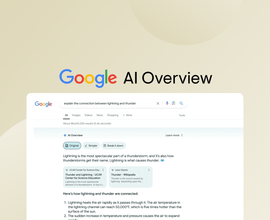May 2024 SEO Industry Updates
- Industry News
- By multiple authors
- 10 minutes read
Conductor’s coverage of the latest industry updates for website optimizations. Get up to speed on Google leaks, the release of AI Overviews, and more!
Google Search’s internal engineering documentation has leaked
By Zack Kadish
The what
The Google search leak that was heard around the web. Do we have the secrets to Google’s ranking algorithm? Nope. Is this the biggest story in SEO history? Nope. Was it interesting and a lot of fun? Yes. Put on your tinfoil hats as we dive deeper into the leaked documents and some actionable takeaways.
If you haven’t heard, on May 27th, some of Google Search’s internal engineering documentation was leaked to Rand Fishkin . Both Rand and Mike King published an in-depth analysis of what they discovered in the leak and how it came to be.
While some SEOs jumped at the opportunity to analyze the findings, others were more hesitant and doubted that this leak actually contained any algorithm secrets.
Not surprising that SEOs aren’t agreeing on something! However, days later, Google did confirm the data leak but urged “caution against making inaccurate assumptions about Search based on out-of-context, outdated, or incomplete information.”
Let’s dive into what the leak contains and what we can learn from it.
The why
Why were SEOs freaking out about this leak anyways? Well, Google never reveals what’s in the secret sauce so this was initially thought to be a peek behind the hood to learn more about what Google might consider some important ranking factors.
Many of the factors that were included in the leak were things that Google has said are not a part of the ranking factors, so this led to many SEOs feeling as if Google has lied to them. Let’s set the record straight - Google isn’t lying to us but they are a business and can’t reveal their proprietary data. They technically don’t have to share anything with us so let’s all calm down.
What were some of the findings from the leak?
Again, none of these factors were weighted and these aren’t confirmed ranking factors - but they are still interesting to dive into.
- SiteAuthority was something that was discovered in the leak. This can indicate that Google uses some type of system to identify domains that are authoritative.
- Clicks are being analyzed and broken out in different ways to determine good clicks from bad clicks. This can indicate that Google might use CTR to determine if users are engaging with certain content based on their queries.
- Authorship is being stored as an entity by Google which indicates that they do care who is writing about a specific topic and want to ensure the content is written by someone authoritative on the topic.
- Other findings were that Chrome data was being used to analyze which pages are being clicked on the most to create site links, placing key content earlier on is important, Google only stores the last 20 changes to a URL
Here are the top highlights:
- The documentation goes against a lot of what Google’s been saying about not using click data, not using browser data, not having site-wide authority signals, domain age not mattering (it likely does),
- In addition to that, there are whitelists in Travel, Covid, and Politics, and Google is using Quality Rater feedback in their algorithms.
- This documentation doesn’t show things like the weight of particular elements in the search ranking algorithm, nor does it prove which elements are used in the ranking systems. But, it does show incredible details about the data Google collects.
What does this mean for businesses?
- Brand matters more than anything else
- E-E-A-T might not matter as directly as some SEOs think, although Google does store who wrote content.
- Content and links are secondary when user intention around navigation (and the patterns that intent creates) are present.
- PageRank, anchors (topical PageRank based on the anchor text of the link), and text-matching have been waning in importance for years. But Page Titles are still quite important
- For most small and medium businesses and newer creators/publishers, SEO is likely to show poor returns until you’ve established credibility, navigational demand, and a strong reputation among a sizable audience.
For everyone & Conductor customers:
This leak shouldn’t change your strategy at all. If you think something is interesting from the leak, test it out and see if it works. We’d be interested if you find anything out!
From an SEO strategy perspective, we should continue to create content for humans and not search engines. The only algorithm update that matters is the heart and the soul of the user. We want to make sure our website provides relevant, useful, helpful, and unique content to our users. If we create this type of content, search engines will reward us for providing value to the users and our users will continue to engage with it. Aleyda Solis has been putting together a resource list of all the documents, tools, and resources around the leak.
Read more about it here:
- Rand Fishkin’s Sparktoro Blog Article of the Google Leak
- Google Algorithm Leak from iPullRank by Mike King
- Google Confirms Search Leak But Urges Caution
Google launches AI Overviews
By Ryan Maloney
The what:
Google finally announced users in the United States would start to see AI Overviews (the artist formerly known as the SGE) appearing in their organic search results during their annual I/O conference. If you were expecting AI Overviews to launch without a hitch and for people to love this new search capability, sadly you’re mistaken. Browse through Google’s Search Help community forums and you’ll find no shortage of people whinging about the AI Overviews experience. Apart from users’ general frustration, what happened next was drama worthy of its’ own Bravo reality TV show. Users began reporting strange and downright comical responses to common queries.
Search Engine Land published a great roundup of incorrect, misleading, and even dangerous AI Overview answers . One that stood out was the answer provided for the query, “cheese not sticking to pizza.” AI Overviews appeared to have sourced content from an 11-year-old Reddit comment that recommended mixing in ⅛ cup of non-toxic glue to the sauce to give it more tackiness. When discussing AI Overviews and other recent search turmoil covered above, a colleague of mine appropriately dubbed it as the real housewives of Google. I can’t wait to see what happens in the next episode.
In response to this less-than-stellar release that feels oddly similar to the initial debut of Bard in 2023. Google published an article somewhat addressing the controversy titled, AI Overviews: About last week . Liz Reid, Head of Google Search conveyed, “user feedback shows that with AI Overviews, people have higher satisfaction with their search results” and “people on social media have shared some odd and erroneous overviews (along with a very large number of faked screenshots).” Liz pointed out that Google holds itself to a high standard and offered further perspective about what happened and the steps it took in response to the odd results. To Google’s credit, the article provides transparency into how they intend to improve AI Overview results.
The why:
Despite the previously mentioned kerfuffle, Google appears committed to making AI Overviews a part of search results. Google previously stated that it expects that hundreds of millions of users will have access to AI Overviews, and they stated they aim to bring them to over a billion people by the end of the year. Since it appears AI Overviews are here to stay, you may wonder, so now what?
For everyone:
Conductor recently published a guide for AI Overviews containing recommendations and strategies to adapt and thrive, covering E-E-A-T, content and ranking shifts, and more. In the wise words of Pat Reinhart, "stay calm and adapt." This isn’t the first Google release resulting in major disruptions and this won’t be the last. If you haven’t started investigating your website’s appearance within AI Overviews, what are you waiting for? Review the most common questions that drive impressions and clicks to your website, as well as questions you care the most about ranking for, and try searching them on Google. Our testing has shown questions tend to trigger an AI overview result.
For Conductor customers:
Create a smart keyword group in keyword settings to capture any question keywords you’re currently tracking by setting rules for keywords containing who, what, when where, why, how, and where. With your “questions keyword group”, navigate to Search Console Analytics and apply your new group to the keyword group filter. Pick the top keywords, and run a search in Google to see if an AI Overview appears for the terms you’re most interested in.
Google updates site reputation abuse policy
By Caroline Wilson
The what:
Heads up, SEO’s! Google recently announced a spam policy called “site reputation abuse” that targets websites that publish low-quality content with the goal of manipulating search rankings. These pages are often created with little to no oversight by the host site and provide little value to users. Google is taking a stricter stance on on-site reputation abuse and will be taking manual actions against any websites that violate this policy.
The why:
In the past, some websites may have gotten away with publishing low-quality content in an attempt to appear higher in search results. However, Google is cracking down on websites that engage in these practices. If a website is found to be violating this site reputation abuse policy, you are likely to receive a penalty from Google.
- Google will be taking manual actions against any websites that violate this policy.
- Algorithmic action is planned for the future to continue to not rank these
- Your website could be deindexed or at very least demoted in search results
For everyone:
It’s important to be aware of any practice that could violate Google’s site reputation abuse policy. You can view examples listed on Google’s spam policies page . Follow these general tips and best practices to avoid being penalized:
- Regularly monitor your website for signs of abuse - including spammy content, low-quality content & links unrelated to your website.
- If you find abuse, take the steps to remove it immediately.
- Be aware about the third-party content you allow on your website.
- Only allow high-quality, relevant content on your website
For Conductor customers:
For Conductor customers, this is an opportunity to make sure all your content is high-quality and valuable to the users that end up on your website. By using the Content Guidance and Writing Assistant features to gather your insights, you can ensure that your website's content is addressing user needs while still being optimized for SEO. Check out Content Scoring in the Writing Assistant feature to make sure that your content is ready to be indexed by Google.
Stay Tuned
Level up your skills and keep your team informed with articles from Conductor’s Academy. Reserve your spot for the June edition of our 30 | 30 series on June 20th, to stay up to date on the last 30 days in Search, in just 30 minutes. Start planning your trip to New York City for Conductor’s C3 Conference to hear from digital marketing and website optimization experts with sessions covering transforming technologies, the evolution of website growth, and what it takes to make meaningful progress in an uncertain future.









